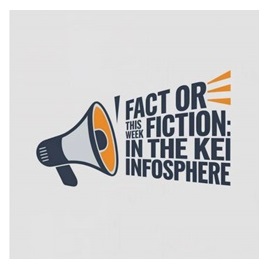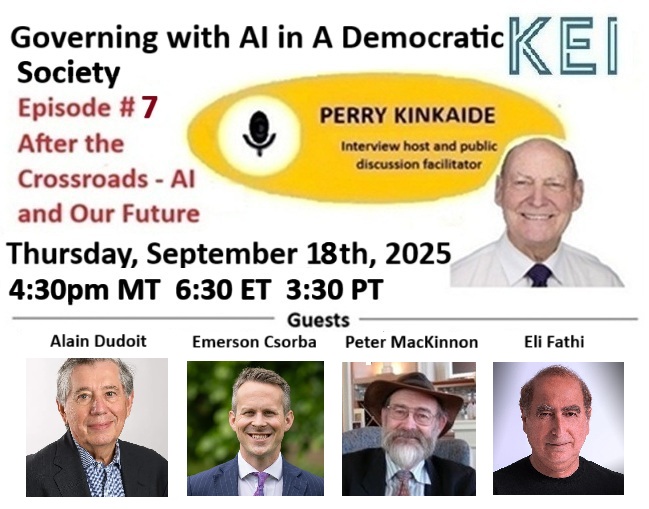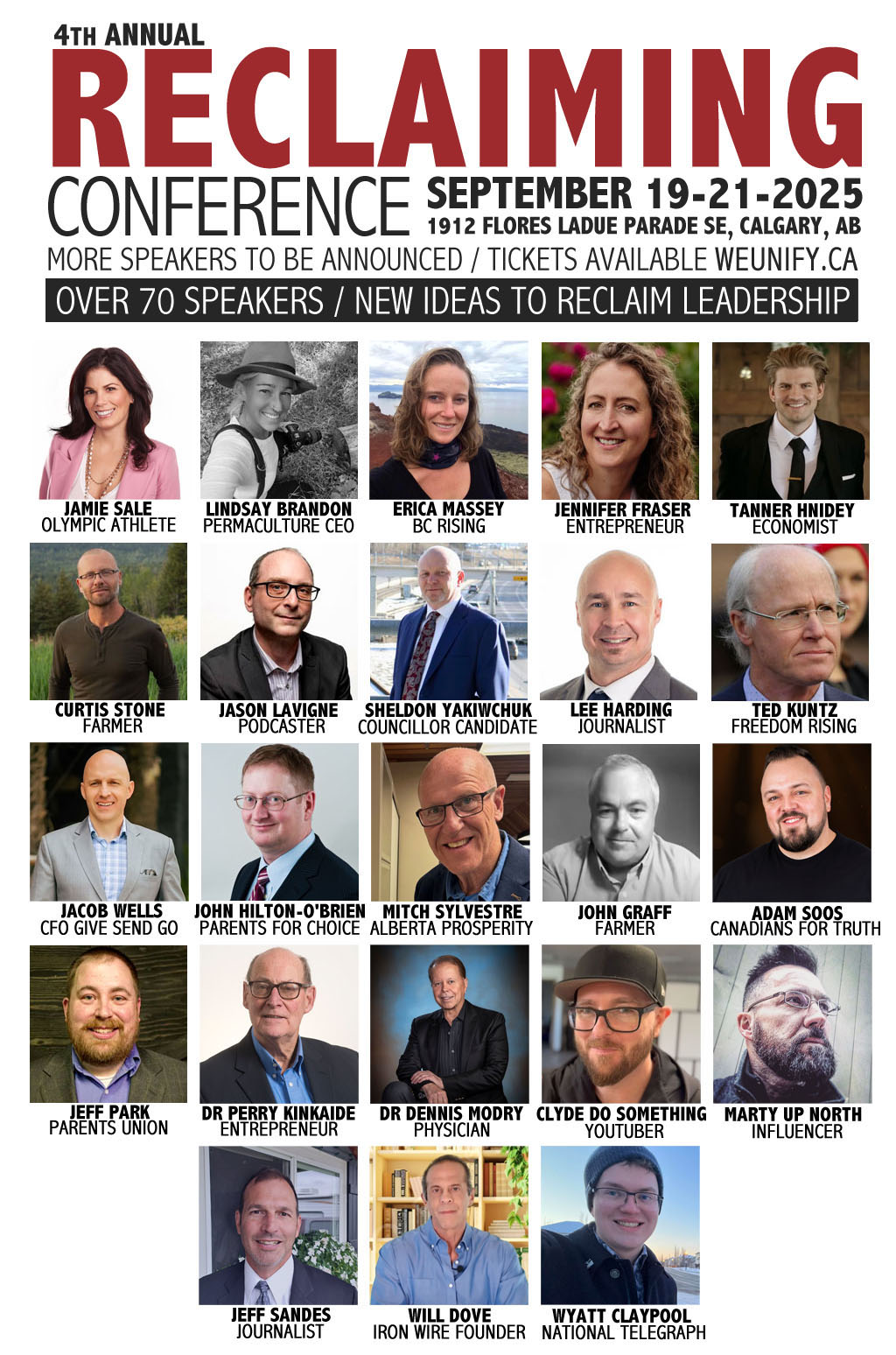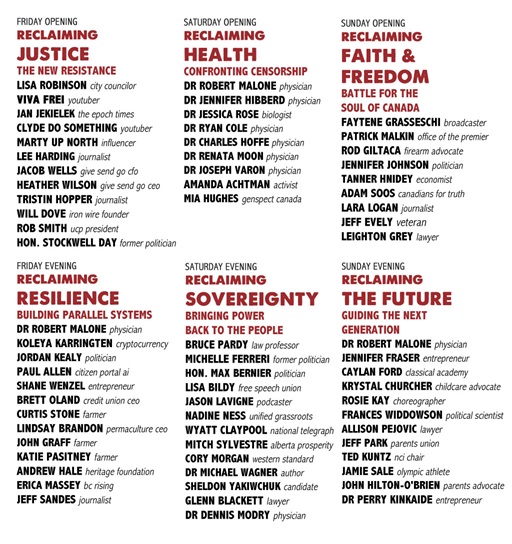|
AI and OUR Future: Governing in A Democratic Society |
DIRECTORY | ||
|
Contributions: |
Action: Help sustain KEI's contributions |
Fact or Fiction?
Climate Changing HERE AI Helping Education HERE |
|
|
Editor - Perry Kinkaide |
Governing in a democracy has never been easy—but the arrival of artificial intelligence raises the stakes in unprecedented ways. AI is not just a tool of efficiency; it is also a temptation for control. In authoritarian societies, it is already weaponized to monitor, predict, and suppress. For democracies, the challenge is sharper: how to harness AI’s promise without undermining liberty, accountability, and trust. |
||
|
This article, “Governing in a Democratic Society: AI as Test and Temptation,” explores the paradox at the heart of our times. AI can strengthen democratic participation, fuel economic development, and improve public services. But it can just as easily distort elections, accelerate inequality, and erode freedoms if left unchecked. The task before democratic governments is not only to innovate, but to regulate wisely—with foresight, courage, and restraint. The question is stark: will AI serve democracy, or will democracy be forced to serve AI? — Editor |
|||
|
Governing in a Democratic Society: AI as Test and Temptation
Government in a democracy is more than a bureaucracy. It is a system of public policy choices, electoral accountability, regulation of excess, and leadership in economic development. These roles are complicated enough in ordinary times. The rise of artificial intelligence, however, raises the stakes: AI can strengthen democracy—or serve as the very tool that undermines it.
The Contrast: Democracy vs. Control. In non-democratic societies, AI is already weaponized for control. Citizens are monitored through social credit scores, every purchase, movement, and association folded into a surveillance web. AI systems predict “untrustworthy” behavior, suppress dissent, and allocate rewards or penalties that shape obedience. The same technologies feed military targeting, cyber-operations, and predictive policing—applications designed to secure the state, not the citizen. Efficiency replaces liberty, and “safety” becomes a mask for control. Continued below
https://us02web.zoom.us/j/84258596166?pw..The PANEL:
Alain Dudoit - distinguished career has spanned senior roles in Canada’s Privy Council Office, CIDA, and the Departments of Finance and Foreign Affairs. Abroad, he represented Canada as Ambassador to the Czech and Slovak Republics, as well as to Spain and Andorra, and served as Consul General in Los Angeles. Since retiring from public service, Alain has combined academic, business, and policy expertise—holding leadership roles at McGill University, co-founding the QG100 and OG100 CEO networks, and advising the Milken Institute. He also played a central role in establishing Scale AI, Canada’s AI and supply chain supercluster. With advanced degrees in law and international relations, Alain brings unique insights at the intersection of governance, innovation, and global competitiveness. Emerson Csorba – is Vice President at Audacity Investments, where he focuses on deep technology within the financial services industry. Emerson has built a career at the intersection of finance, renewable energy, and global geopolitics. Previously, he served as Deputy CEO of Ridge Clean Energy, where he advanced large-scale renewables projects in the UK, and as Chief of Strategy and Partnerships at the Ditchley Foundation, helping modernize one of the world’s leading convening bodies on democracy and international relations. Beyond his executive leadership, Emerson brings academic depth as a Clarendon Scholar with a PhD in Theology from Oxford University and an MPhil from Cambridge. He is also a published author, frequent media contributor, and experienced advisor to leaders across government, business, and civil society. His work exemplifies how networks, strategy, and mission-driven leadership can shape both organizations and global conversations. Peter MacKinnon - is a management consultant and academic with a remarkable breadth of experience—as a scientist, entrepreneur, executive, diplomat, and policy advisor. His consulting work spans every continent, advising governments and businesses on science, technology, innovation, and digital transformation. Peter has been a pioneer in areas ranging from artificial intelligence commercialization to Smart City initiatives, telehealth, and advanced computing infrastructure. He has represented Canada at the OECD in Paris, advised the Canadian Space Agency, and continues to lead thinking on the ethics of AI, the future of governance, and workforce development for emerging technologies. Currently, he serves as Executive Director of the Global Research Institute on Integrity for Technology and remains deeply engaged in international advisory, academic, and policy circles. Eli Fathi - is a visionary leader who founded multiple successful technology companies built on his drive to make a positive di>erence in the world by developing new products to serve global markets. Over more than four decades, Eli has been on the forefront of this technology arc educating peers and the public before the products become mainstream. He provides advice, mentoring and coaching on technology and business to multiple organizations and individuals. He has numerous publications on business and the impact of Artificial Intelligence (AI) on society. In recognition of Eli's contributions to advancing the field of engineering-related technologies and his coaching and mentoring services, he was awarded the Order of Canada in 2022. In 2025, Eli was named Fellow with the Canadian Academy of Engineering. Continued from above Democracies face the paradox of using many of the same AI applications—security, emergency response, even taxation—yet must reconcile them with rights and freedoms. Here the challenge is sharper: how to govern without overreaching, how to regulate without replicating authoritarian excesses.
Governing: Public Policy and Elections. In democracies, public policy is set through elections and debate. But AI is already bending this process. Micro-targeted advertising, deepfakes, and algorithm-driven news feeds threaten to distort political choice. Candidates can be packaged by machines, messages tuned not for truth but for emotional resonance. Voters risk becoming consumers of campaigns rather than participants in democracy.
This is the democratic dilemma: From legal frameworks to public trust, can governance keep pace with technologies that move faster than regulation? What does responsible AI governance look like? And who decides the rules in a landscape dominated by both state power and corporate actors?
Economic Development. AI also looms over economic development, where governments are expected to balance growth with fairness. Algorithms drive investment decisions, predict market shifts, and accelerate productivity. Yet they also threaten jobs, disrupt industries, and challenge tax regimes. One temptation for governments is to lean heavily on AI-driven efficiencies—using data extraction, digital taxation, or tariffs as tools of policy—while overlooking the human costs of displacement and dependency.
As Mark Carney recently emphasized in his call for a bigger, better economy, governments are now judged not only by growth but also by their ability to ensure quality of life, sustainable jobs, housing, and safety. AI can accelerate these goals—or deepen inequality if left unchecked.
The Dual Challenge: Embracing and Governing AI. For democracies, the challenge is twofold: to embrace AI’s potential—harnessing it for prosperity and participation—while also governing it to prevent abuse, manipulation, and inequity. Embrace without oversight risks surrendering democracy to corporate or authoritarian powers; regulate without vision risks missing opportunities that sustain prosperity and trust. The path forward requires both courage and restraint, with governments acting as stewards of innovation as much as watchdogs of excess.
The Path Forward. Public services—from healthcare to policing—have already been examined in this KEI series. Here the focus must be on governance itself: how AI reshapes the legitimacy of democratic decision-making and the economic foundations of society. Democracies must regulate AI without smothering innovation, deploy it without undermining liberties, and legislate with an eye not just to today’s abuses but tomorrow’s temptations.
The lesson is clear. AI is not just another technology to be slotted into existing systems. It is a force multiplier for whatever values a society already holds. In authoritarian states, it amplifies control. In democracies, it can amplify participation—but only if guided by foresight, restraint, and an unflinching commitment to the principles of liberty and accountability.
The test of democratic governance in the age of AI is not whether the technology is powerful. It is whether citizens and their governments can remain more powerful still.
|




 No need to register. Just Zoom in
No need to register. Just Zoom in

